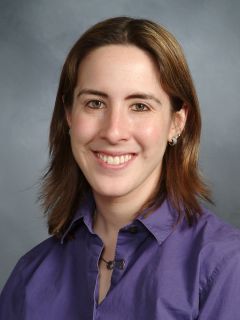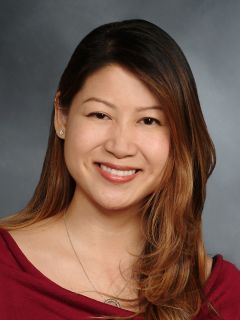January is National Mentoring Month. This month celebrates the importance of mentoring and how the relationship built between mentor and mentee impacts one's life and career. In recognition of National Mentoring Month, we talked to one of the Department's mentor-mentee pairs, Dr. Erika Abramson, Assistant Dean of Education Research, Outcomes, and Innovation and Associate Program Director for Pediatric Graduate Medical Education and Dr. Catherine Chang, Director of Neonatal Resuscitation and Simulation and Assistant Professor of Clinical Pediatrics, about the benefits of mentoring and how it's impacted their careers. They offer advice and share what they enjoy most about working together.
Erika Abramson, MD, MSc (Mentor)
What is your approach to mentoring?
My approach is to really take time to understand what my mentee’s goals are, personally and professionally, to help make sure that I help them achieve what they want. And also to make sure we address these frequently, knowing things might change over time.
What are successful mentoring techniques that you find beneficial to the mentor-mentee relationship?
A few techniques: first: setting out clear expectations for both what I will contribute to the mentoring relationship and then what I expect my mentee will contribute; second, making sure that we set regular, frequent meetings; third – utilizing the concept of sponsorship – I really want to help promote my mentees, find external opportunities to raise their profile, etc.; fourth – making sure that the advice I provide is honest; and fifth – regular bi-directional feed.
What do you enjoy most about mentoring?
I love seeing my mentees flourish and watch them achieve success.
How has being a mentor impacted your work?
It has impacted my work in so many ways. It has certainly made me a better researcher, because I have to critically think through my mentees projects so I can help guide them. It has helped me refine skills in areas I realized I had deficits. It also has allowed me to get involved in research in other areas.
What have you enjoyed most about working with Dr. Chang?
Watching her grow into the successful educational researcher she is today. She has managed to accomplish so much, despite having a huge amount of clinical and administrative responsibilities, and becoming a mom.
Catherine Chang, MD (Mentee)
 Why is mentorship important to one’s career?
Why is mentorship important to one’s career?
Mentorship is an integral part of career development and success. Mentors offer valuable perspectives. Those who have “walked the path before you” can help you see the bigger picture and how current decisions and opportunities might fit into the longer arc of your career. And those who offer clear, honest feedback can provide an essential window into helping you understand how to improve.
What advice do you have for people looking to find a mentor?
Know who you are and what you need. Once you’ve identified your own goals and asks, build a network of mentors that you can rely on for different perspectives and needs. You may find that one mentor may be great for regular, monthly meetings to keep you on track toward achieving a specific goal, whereas you may reach out to another mentor once or twice a year for very specific career questions. And don’t limit your search for mentorship to your own division, department or institution. Sometimes the best perspectives come from outside!
How has mentoring helped your career?
Mentors have helped me recognize areas that I excel and given me boosts of confidence to pursue projects I would have been intimidated to consider on my own. Having external accountability and people with whom I had “deadlines” with, keeps me on track and helps me prioritize long term, career building work.
What do you think makes a good mentor?
A good mentor is available and willing to commit their time. They are mentee centered, helping them build self-efficacy and equipping them with tools to achieve their goals, while remaining supportive. A good mentor is open and honest.
What has Dr. Abramson’s mentorship meant to you and your career?
Despite how busy she is, Erika is incredibly generous with her time. She is a problem solver and a connector and has broadened my reach and capabilities by freely sharing her own resources and contacts. Most importantly, Erika has encouraged me to be kinder to myself. She has challenged me to reconsider goals and perspectives to find a balance between work and my evolving role as a mother. This has probably been the biggest impact of her mentorship as it has helped me strive for a sustainable pace in academic medicine.

